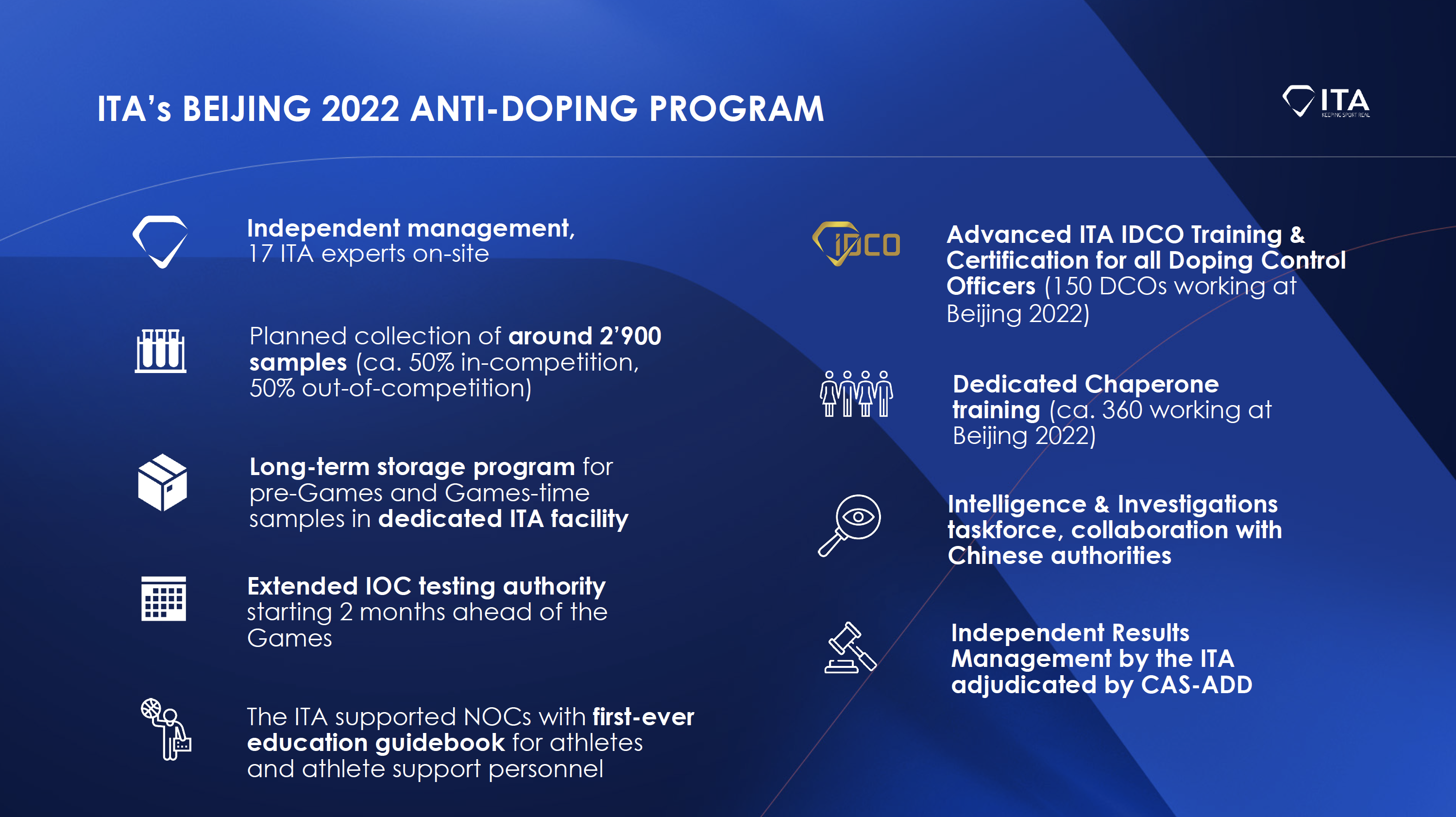Menu
 Back
Back
5 February 2022
The ITA had already begun its out-of-competition testing operations with the opening of the Olympic Villages at the end of January. The organisation’s 17 staff members present in all three venue clusters of the Winter Games will now additionally manage and oversee in-competition doping controls. Testing is targeted, relying on risk assessment, intelligence & investigations, data analysis and information provided by the ITA Beijing 2022 Pre-Games Expert Group. This approach ensures that the resources allocated to the fight against doping at the Winter Games are used responsibly and efficiently, with the quality of testing taking precedence over quantity.
To enforce this targeted approach and to ensure that relevant information is shared with the ITA’s Intelligence & Investigations (I&I) Department, a dedicated ITA Beijing I&I Task Force has been created. In addition, a dedicated secure intelligence platform was established to facilitate anti-doping organisations worldwide to share any relevant intelligence directly with the ITA. Part of these efforts includes a multi-lateral agreement with Chinese law enforcement and customs authorities. The ITA furthermore encourages all athletes, athlete support personnel or other persons with suspicions about potential doping offences to share these via the ITA’s confidential reporting platform REVEAL.

Hundreds of local and international experts and volunteers are deployed to implement the entire anti-doping program for the Games. Around 150 Chinese and international Doping Control Officers perform tests in the Doping Control Stations at the various venues, all of them received the ITA IDCO certification in preparation for their mission at this high-level major event. More than 360 Chaperones, all Chinese volunteers, also received dedicated training and will be responsible for notifying athletes that have been selected for testing. The ITA operations are supported by the human and logistical resources of the Organising Committee and the Chinese Anti-Doping Agency (CHINADA) as well as dozens of international experts for the implementation of these large-scale clean sport activities.
The around 2’900 samples that the ITA plans to collect will be analysed in the WADA-accredited anti-doping laboratory in Beijing. Next to the usual urine and blood samples, an innovative new collection process will be introduced for the Winter Games, the Dried Blood Spot method. Less invasive, it only requires one drop of blood following a prick in the finger instead of the sampling with a needle. Gene doping analysis will also be performed for the first time at an edition of the Olympic Winter Games. Which type of test an athlete is subject to depends on his or her individual risk assessment and the resulting type of analysis that is required. After the Games, all samples will be stored for up to 10 years in the ITA’s Centralised Long-Term Storage Facility and can be re-analysed at a later moment in time.
For the protection of all athletes that are tested, rigorous sanitary precautions and COVID-19 countermeasures are implemented to avoid putting them at risk during doping controls.
Should athletes need to use a prohibited substance to treat a medical condition, the ITA will oversee the processing of Therapeutic Use Exemptions following careful review by an expert independent medical panel.
As the IOC has also delegated results management to the ITA, the organisation will review all laboratory results and prosecute all potential anti-doping rule violations before the Court of Arbitration for Sport’s Anti-Doping Division (CAS ADD) for adjudication, making the entire legal process for the Winter Games completely independent.
All aspects of the ITA’s anti-doping operations for Beijing 2022 will be subject to monitoring and observation by a team of independent experts appointed by the World Anti-Doping Agency (WADA).
22 November 2021

16 November 2021

5 October 2021
